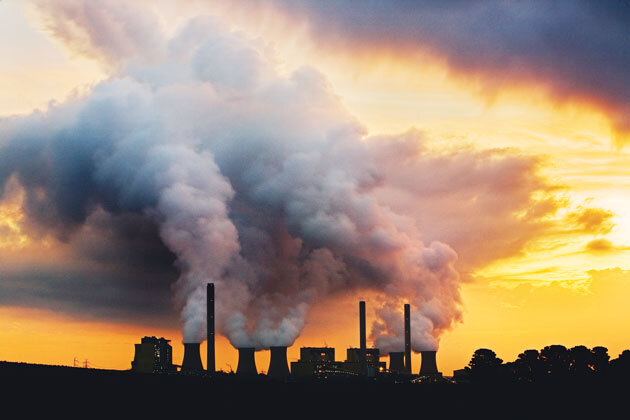Oil Companies and Spills
Every few months we hear about another oil spill happening, with the most recent being the spill off the coast of Mauritius. Damage to marine environment and the contamination of local ecosystems and the food supply chain are a few of the consequences of these spills. Why do we rely so much on fossil fuels and why does the industry not care about climate change?
Crude oil is a liquid fossil fuel. It is an unrefined petroleum product composed of hydrocarbon deposits and other organic materials and can be found in underground reservoirs.
Burning fossil fuels contributes massively to local air pollution and produces carbon dioxide, which is the largest driver of climate change. But fossil fuels are efficient, convenient, readily available and a trillion dollar industry. And this industry doesn’t care about pollution. In fact, the fossil fuel industry has known about the climate crisis for decades and still keeps denying it.
Let’s rewind a little.
In 1919 the American Petroleum Institute (API) was set up and from the beginning the oil industry recognised pollution issues. In the 1940s, LA had a lot of smog because there were more cars on the road. When people started to blame the oil and gas industry, the API set up the Smoke and Fumes Committee in 1946, to fund research into smog and other air pollution issues. They funded research at different institutes, but their most sustained partnership was with then newly created Stanford Research Institute (SRI).
The Smoke and Fumes committee was comprised of executives from leading oil companies. Oil and refinery companies were also well represented on the SRI board. Whilst it seemed like they were trying to find the cause and solution, the goal of this collaboration was to prevent environmental regulations that they deemed hasty, costly and unnecessary. Their aim was to offer alternative theories on how smog was created.
In 1957 the Brannon Report, commissioned by Exxonmobil, was the first paper that provides the earliest indisputable evidence that the oil company knew of climate science and risk.
In 1968, the Robinson Report, which was written by researchers from the SRI, detailed rising levels of co2 and warned of climate risks such as melting ice caps, rising sea levels and global environmental impact. However, the reaction of the API was to ask the researchers to go back and check their work. After that, they only publicly highlighted parts of the report where it reported uncertainty.
In 1977 a senior Exxon company scientist, James F. Black, reported to Exxon that carbon dioxide from the use of fossil fuels would warm the planet and endanger humanity. Exxon responded spreading misinformation and doubt to the public.
Not only is it clear now that the industry knew about climate change, they actually used their knowledge for their own good. In 1969, Exxonmobil took a tanker and icebreaker to Alaska to plunge through the Arctic ice to the new Alaskan oil fields. They knew the ice was going to melt over the years due to climate change and the oil rigs that were built in the Arctic in the 60s were built knowing that the ice would be thinner later. Moreover, other oil rigs around America were also built to stand strong winds and rising sea levels, which the companies knew were happening.
Exxon has funded a network of climate deniers to confuse the public and delay action on the climate crisis. They have also donated millions of dollars to republicans in congress who deny climate change. And they are not the only oil giant to do so. Many pour millions into political campaigns, propaganda and lobbying and Rex Tillerson, who was the CEO of Exxon, was nominated by Trump as Secretary of State.
Oil Spills
Back to oil spills and how they happen.
The oil is accessed by drilling on land or at sea or by strip mining. Once extracted, oil is transported to refineries via rail cars, trucks, tankers or pipelines to be transformed into usable products such as gasoline, diesel, and various other petrochemicals like plastics.
Wherever oil is drilled, there will be spills and this happens both in the ocean and on land. These spills are impossible to clean up and how difficult it is depends on many factors including the type of oil spilled and the environment. Smaller oil spills occur regularly and are often not even mentioned. Once it gets into marine environments it is extremely rare to recover more than 20 percent of oil. Because oil companies are fined per barrel of oil (under the Clean Water Act), they often say the oil spills weren’t as big as they actually are.
The largest accidental oil spill in history was BP’s Deepwater Horizon Oil Spill in 2010. About 200million gallons of oil were released and about 2100km of the US Gulf Coast from Texas to Florida were coated with oil. BP paid $65 billion in compensation to people who relied on the gulf for their livelihood.
Some oil spills are done on purpose. In January 1991, large quantities of oil were spilled into the Persian Gulf. The goal of this was to impede US troops from attempting beach landings, but it resulted in over 240 million gallons of crude oil being dumped into the Persian Gulf.
In July a bulk carrier ran aground and oil started leaking into the ocean near Mauritius. Around 300.000 gallons have now been spilled. Mauritius has some of the finest coral reefs in the world and depends on its seas for food and tourism. But really, any oil spill anywhere has a huge impact on the environment.
Oil industry giants are now wanting to drill in the arctic. An inevitable oil spill would be impossible to clean because of the harsh Arctic conditions.
It is time for clean, renewable energy.
Sources:
https://ourworldindata.org/fossil-fuels
https://www.smokeandfumes.org/fumes



